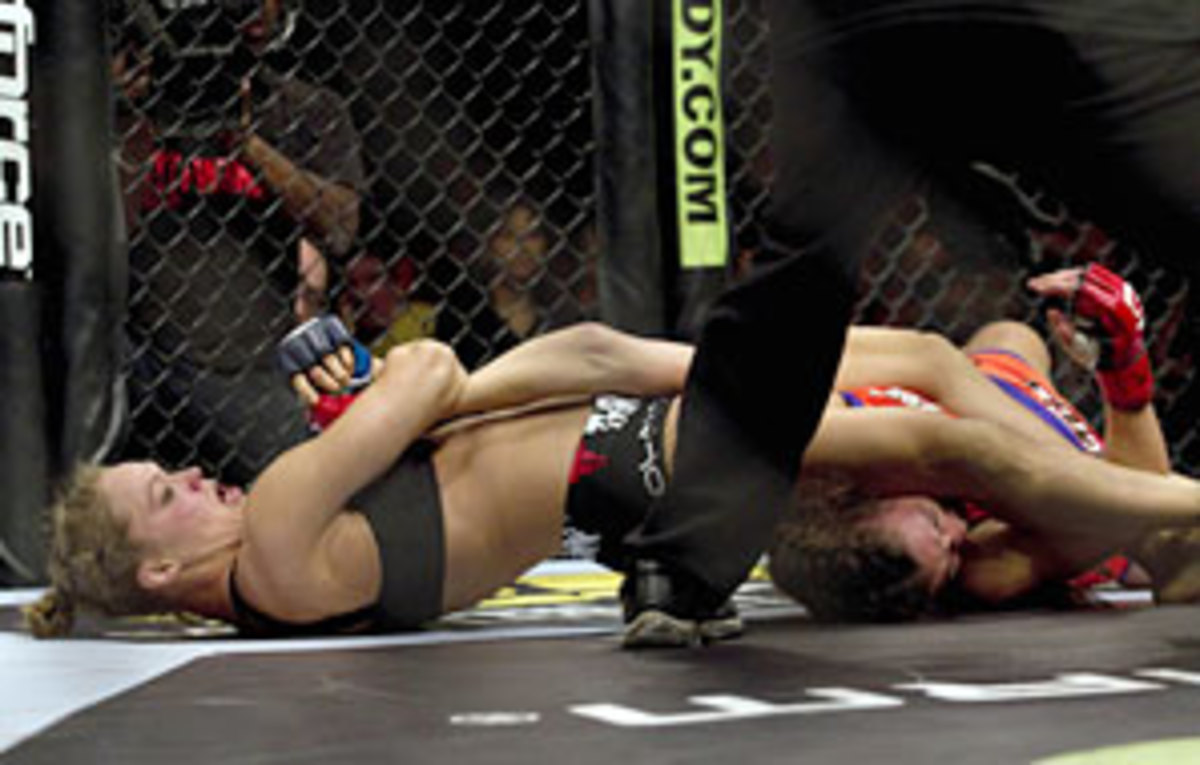
Was submission victim Miesha Tate too tough for her own good?
While defending her Strikeforce 135-pound title against Ronda Rousey in Columbus, Ohio, Tate found herself locked in a first-round armbar with no means of escape and too much time left on the clock to simply ride it out. She'd narrowly pulled out of a similar attempt earlier in the fight, but this was one more serious, and she must have known it.
As every novice grappler learns one way or another, when you get caught like that you can either tap out and swallow the loss or hang on and find out how sturdy your bones and ligaments are. The fighter is given a choice between two bad options: tap or snap. Tate managed to choose both.
It was as agonizing a submission as I've ever seen. Her arm bent a way that human limbs just aren't made to, and then it kept on bending. At first Tate refused to give in, even though she wasn't doing much in pursuit of an escape other than writhing in pain. Reluctantly, she eventually tapped Rousey's leg after it became clear that referee Mark Matheny wasn't going to do anything but stand by and watch whatever horror might unfold. Finally it was over. Rousey jumped up to celebrate, while Tate lay on the mat with her useless arm flopped beside her like a dead bird that had fallen into the cage.
It had to be the worst possible solution to the problem of the armbar, and for what? Pride? Somehow, Tate was lucky enough to escape without any broken bones -- consider my understanding of human physiology forever altered by that fact -- but she still lost the fight in the end. She risked more injury than she needed to, and risked it knowingly, without any realistic hope that it might result in anything good happening for her. It was pure stubbornness, and maybe the kind of stubbornness that only the fighter can truly understand.
For instance, the morning after the fight former Strikeforce champion Marloes Coenen (who Tate took the belt from last year) tweeted that Tate had "earned my RESPECT for not tapping at that armbar!"
Again, Tate did tap eventually, but it's almost beside the point. Coenen is a submission specialist herself, not to mention a veteran fighter with more than a decade in this sport, so shouldn't she know that sometimes the tap is the better part of valor? Did Tate -- who, by this point, has already demonstrated herself to be among the best female fighters in the world -- really need to prove anything about her toughness? And at what point do you become too tough for your own good?
The more I think about it, the more this mentality seems like a by-product of the fighter personality that just can't be reasoned away. Simply being the kind of person who would rather snap than tap doesn't, by itself, make you a fighter. At the same time, you probably won't last long in this sport without an obstinate streak that borders on self-destructive. Particularly a female fighter like Tate -- who, by sheer necessity, came up training with mostly male sparring partners -- has to be the kind of person who will almost eagerly take a beating just to prove she can. The same things that make a fighter mentally unbreakable might also make her dangerously out of touch with reality at times. Times like, say, when her arm is going in all the wrong directions at once.
I remember UFC welterweight Mike Swick telling me once that he'd "never tap to a choke" in a fight. Swick was and probably still is one of the most reasonable and intelligent people I've ever come across in the fight game. He's the kind of guy who, when you meet him, you can't help but wonder why he's getting punched in the head for a living rather than running a Fortune 500 company. It surprised me to hear him espouse this bit of tough guy philosophy. Why couldn't you tap to a choke when you knew you were stuck? What did you prove by letting your opponent put you to sleep?
At the same time, I thought it was telling that he specified chokes and not submissions in general. The flip side to that declaration, which Swick left unstated, was that an armbar or heel hook or knee bar was a perfectly legitimate thing to tap to, since only a fool chooses injury and a lengthy rehab over the relatively minor indignity of submitting. So I thought, anyway. At least until I saw Tate let herself be put through the ringer, and then saw the support from fighters who might have been secretly hoping that when their own moment of truth came, they'd have the same courage to offer up their bodies for the sake of a bitter, fleeting sense of pride.
Swick, by the way, had his own maxim tested a few months after our conversation, when Paulo Thiago got him in a choke at UFC 109. And what do you think? Of course he refused to tap. I sometimes wonder if, as his vision dimmed and his body went limp, he still felt like it was the noble choice he had imagined it to be.




